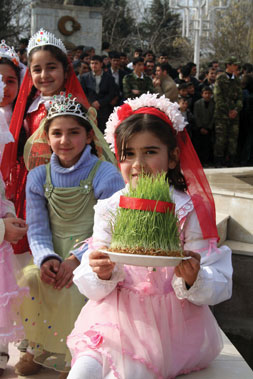 Pages 80-85
Pages 80-85by Dr. Rafael Huseynov
The Azerbaijani people have several holidays connected with agriculture and stock-rearing, which have been celebrated since time immemorial. But the holiday of Novruz, which marks the coming of a new astronomical year and the reawakening of nature, has always been the Azerbaijani people´s most cherished holiday. Novruz is celebrated every year on 20-21-22 March, from the moment of the vernal equinox. But according to tradition, people begin to prepare for this holiday from the last month of winter, continue the holiday celebrations with the arrival of the equinox and carry on celebrating into the New Solar Year.
Azerbaijanis love Novruz for its democratic philosophy. It is not just a holiday to mark the vernal equinox, it is a holiday of the equality of the people. It brings together different sections of the population, strengthens mutual esteem, mutual understanding and social cohesion.
An ancient holiday
The history of Novruz in Azerbaijan with its traditions of jumping over bonfires and popular entertainment goes back millennia. Some customs, such as the collective performance of the Yalli dance, are reflected in the rock paintings at Qobustan. Azerbaijanis in the villages near Qobustan today perform these ancient ceremonies to mark Novruz.
Azerbaijan is a country of oil, gas and mud volcanoes. Spontaneous fires on the Absheron Peninsula and elsewhere in Azerbaijan have attracted crowds of fire-worshippers from across the Middle East and India who revere these places as holy. This laid the foundation of the Novruz customs and traditions related to fire.
In days of old Novruz in Azerbaijan was called Turan and was celebrated for seven days. Under the influence of this custom weddings in Azerbaijan used to last seven days and the number seven is still reflected in the tradition of having seven different dishes on the holiday table.
The centuries of Novruz celebrations in Azerbaijan have left an indelible mark on the poetic heritage. There are many poems devoted to Novruz written by classical authors and modern poets. People have always sung songs about Novruz, both folk songs and professional pieces. The great Azerbaijani poet Nizami Ganjavi wrote in his Khamsa or Five Tales that Novruz was celebrated in 350 BC, that is, 24 centuries ago.
As the most striking expression of the Azerbaijani national spirit, official celebrations of Novruz were banned during the Soviet years. But, in spite of the prohibition, every Azerbaijani family considered it a moral obligation to celebrate the holiday with all its customs.
Every year Azerbaijanis celebrate the last four Tuesdays of winter before Novruz, which are known as Ilakhir Charshanba. The Tuesdays represent the elements of life - earth, wind, fire and water. There are many poems, songs, rituals and beliefs concerning each of these Tuesdays. Every year on the eve of Novruz traditional sweets and cakes are made:
shakarbura - pastries stuffed with sweet nut filling and spices
shor chorayi - a savoury puff pastry bun with turmeric or other spices
bishi - sweet flat cake
Quba, Ganja or Baku bakhlava - layers of puff-pastry with nut filling
fasali - flat cakes
kulcha - sweet spiced bread
samani khalva - a sweet made from sprouting wheat
Shoots of sprouting wheat are an essential decoration of any Novruz table. A few weeks before Novruz, take a handful of wheat seeds, which symbolize abundance, water them, and sing the traditional song ´Seeds, protect me, and I will grow you every year.´
Traditional Novruz beliefs
It is traditional to plant a tree at Novruz and in no instance should a tree be cut down. According to popular belief, it is a good sign to plant a mulberry tree, fig tree or chestnut tree at Novruz. This tradition is continued in modern-day Azerbaijan with the laying out of parks, gardens and green areas at Novruz.
The ancient tradition is continued of presenting a khoncha or tray of sweets and nuts to people who work on the land.
Whoever is planning to build a house believes that the foundation should be laid during Novruz so that the house should always be successful.
It is a golden rule of Novruz that on these days you should not curse, lie, swear, gossip or criticize – in other words you must not do anything bad.
Police statistics show that crime falls to almost zero during the Novruz holiday. This is the result of the moral foundations of Novruz that have come down through the centuries.
Untidiness and slovenliness are frowned upon at Novruz. Houses are cleaned and tidied and people revamp their wardrobes.
It is an unwritten rule that people who have quarrelled or fallen out with one another should be reconciled without mediation. It is considered a sin not to forgive those who admit their guilt. Azerbaijanis call the second day of Novruz Ata-Baba, that is, ´fathers-grandfathers´ and on this day the whole family visits the graves of their nearest and dearest. As far as possible everyone should celebrate Novruz in their own home with their families.
A ritual prescribed by Zoroaster in antiquity is maintained to our day – on the Last Tuesday (Akhir Charsanba) before Novruz you should jump over a bonfire, light torches and put lit candles on the table. During the night of the Last Tuesday and throughout Novruz as many candles as there are members of the family are lit and must not be blown out ahead of time.
In the evening on the Last Tuesday children knock at the doors of neighbouring houses, leave a hat or small sack on the threshold or throw them over a fence and hide. The householders should return the hats with holiday treats.
An ancient Novruz tradition is to burn uzarlik (rue), which provides protection from the evil eye and negative energy; its smoke is wafted over children, the house, cattle and pets. According to folk tradition, at the moment that the new day of the New Year arrives, you should go out of the house into the yard or stand at an open window and make a wish.
Another Novruz ritual related to the economy and stock-rearing is to tie a red ribbon, usually reserved for weddings, round the horns of bulls, cows and sheep.
At Novruz it is forbidden to kill horses, dogs and even snakes.
Flowers are at the heart of one of the best Novruz customs in Azerbaijan. People pick snowdrops, lilies of the valley and mint. They weave garlands from wild flowers and plait flowers into girls´ hair. It is forbidden to bring daffodils to the house.
Musical gatherings take place at Novruz. Minstrels and folk singers sing songs and public games are held - tightrope walkers demonstrate their skills, wrestlers test their strength and shows are performed in public squares. The comic show Kos-Kosa is performed across Azerbaijan at Novruz.
Every home should prepare different dishes at Novruz and they must include pilaff (Azerbaijan has more than 100 sorts of pilaff). There is a tradition of dying hard-boiled eggs and playing a game to see which is the harder.
Another Novruz custom concerns horses. People take better care of all their animals at this time, feed them better fodder and dress up their horses. In the countryside, equestrian competitions take place and people play chovgan, a game similar to polo. People prefer not to lend money at Novruz, because their household could lose its prosperity in the coming year.
During Novruz people are given their holiday ´portion´ or Novruz payi. Holiday cakes, samani and candles are put on a tray and sent to neighbours and friends. The tray with holiday cakes is called the khoncha and it should not be returned empty, or the house will no longer be prosperous, according to popular belief. It is good to give New Year presents not only to Azerbaijanis, but to representatives of other nations too so that they can enjoy the sweetness of Novruz. Other nationalities that live in Azerbaijan look forward to Novruz too.
Benevolence and charity for those in need are also a Novruz tradition. Over the past 15 years both the state and ordinary people have been keen to provide Novruz help to the refugees and internally displaced people from the Azerbaijani land occupied by Armenia.
The number of weddings increases during Novruz. According to popular belief, families created during Novruz will be happy. Boys born during the holiday season are often called Novruz while girls are called Bahar, which means ´spring´.
The largest samani or wheat shoots in Azerbaijan are grown on top of the ancient Maiden Tower in Baku. A local beauty, Bahar khanim - Miss Spring, chosen by the people, lights the torch on top of the tower to welcome Novruz.
A holiday of the sun
Novruz is a public holiday in Azerbaijan. Traditionally, the head of state congratulates the public on Novruz, attends festive events and signs into law measures to improve public welfare. Concerts and special Novruz programmes are broadcast on TV.
Over the last 30 years many of the Novruz traditions that were passed down orally have been written up and recorded on film and CD.
Novruz in Azerbaijan has always been a spring holiday that celebrates the revival of nature, moral purity and equality. It was and remains primarily a holiday of the Sun and its earthly representation, Fire.
Another ancient Novruz tradition in Azerbaijan, maintained by young people, is to light bonfires on mountain tops at night and remain awake till morning. This custom is called Greeting the Sun and just before dawn the young people sing the song Godukhan in chorus. Just as it has over the millennia, Novruz will come to Azerbaijan again and again. People will light bonfires and when dawn breaks and the first rays of sun strike through, they will exclaim:
´Hello, Sun! Hello, Spring! Hello, New Day!´
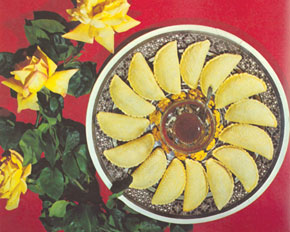
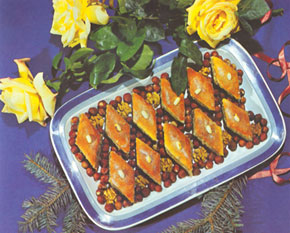
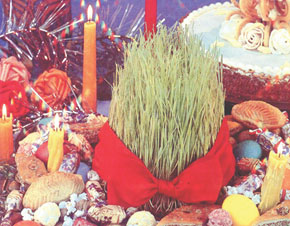
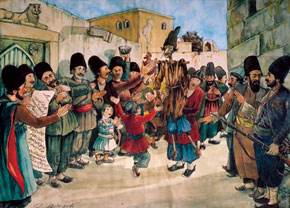
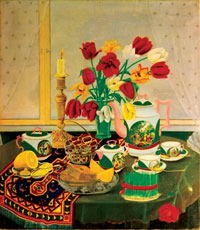
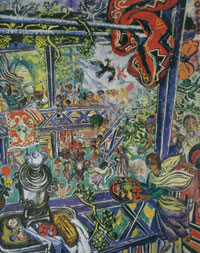

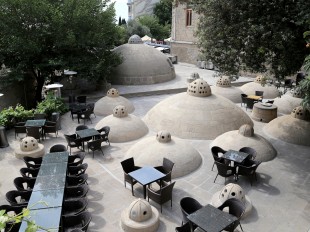
.jpg)